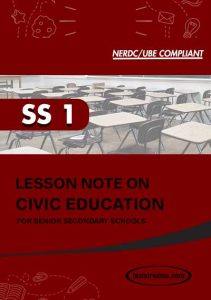This CIVIC EDUCATION Lesson Note was pulled from our book (Lesson Note on CIVIC EDUCATION for SS1 MS-WORD); Compiled to serve as reference material to help teachers draw out their lesson plan easier, saving you valuable time to focus on the core job of teaching.
This Civic Education Lesson Note Covers The Following Topics
- INTRODUCTION TO CIVIC EDUCATION
- VALUES
- COMMUNITY SERVICES AND THEIR VALUES
- HIV/AIDS
- YOUTH EMPOWERMENT
- GOALS OF CITIZENSHIP EDUCATION
- NATIONALISM
- CHARACTERISTICS OF DEMOCRACY
- RULE OF LAW AND PRINCIPLES OF RULE OF LAW
- LIBERTY
- MINORITY AND MAJORITY INTEREST
- MAJOR PILLARS OF DEMOCRACY
- ARMS OF GOVERNMENT
- OTHER STRONG INSTITUTIONS OF A DEMOCRATIC GOVERNMENT
- FREEDOM AS A PILLAR OF DEMOCRACY
- MEANING OF THE STATE GOVERNMENT AND THE LOCAL GOVERNMENT
- DEFINITION OF CITIZEN AND ALIEN
- POLITICAL PARTIES
- THE PRESS – THE ACTIVITIES OF THE PRESS IN ENSURING DEMOCRACY
- UDHR (UNIVERSAL DECLARATION OF HUMAN RIGHTS)
- THE MEANING OF THE SEVEN CORE FREEDOM OF UDHR
- AGENCIES RESPONSIBLE FOR PROTECTION OF HUMAN RIGHTS
- PROJECT WORK
- CULTISM
- LAW AND ORDER – RESPECT FOR CONSTITUTED AUTHORITY
- TYPES OF CONSTITUTED AUTHORITY
Sample note
Week 1
Topic: Introduction to Civic Education
Content:
- Meaning and Needs for Civic Education
- Objectives/Reasons for Civic Education in Schools
- Importance of Civic Education/Agents of Civic Education
Meaning and Needs for Civic Education
Civic education was coined from citizenship education, which simply means an educational and learning activities specifically meant to create awareness, teach right values, right attitudes and behaviour that are acceptable to the society where individual lives.
It is therefore a type of educational and learning activity to create awareness in students at all levels of education (both informal and formal)
Objectives/Reasons for Civic Education in Schools
- To teach right attitudes: students must understand what right attitudes and wrong attitudes are. For example laziness, truancy, bad gang, smoking etc. are bad attitudes
- Encouragement of good citizenship:a good citizen is someone who contribute positively towards his/her community growth and national growth.
- Disagreement of bad and unholy behaviour:bad behaviour such as indecent dressing, sagging, cheating in examination, stealing, bad group and other should be discouraged and do away with.
- To teach good leadership and followership:leaders are mirror of the society, a good leader therefore should be someone who seeks at all times and work hard towards solving his/her followers’ problems. A good follower is someone who is hardworking and performs his/her expected duties and obligations to the state and community where he/she resides.
- To encourage the spirit of friendship and cooperation:‘United we stand, divided we fall’. The spirit of friendship, cooperation, harmonious relationship, religious tolerance among others are keys towards individual, community and national development.
VALUES AND IMPORTANCE OF CIVIC EDUCATION
- Civic education is necessary towards proper upbringing of an individual.
- Civic education is essential for self-reliant, self-growth and indigenous individual.
- It enhances individual growth, thereby encouraging nations development and rapid progress
- It encourages peaceful co-existence among people of diverse nationality like indigent.
- It encourages good leadership and followership.
AGENTS OF CIVIC EDUCATION
- Family: it is often said that ‘charity begins at home’. Family is the first agent of socialization and the first agent to educate the child on ‘do and don’t in the society. The family is expected to teach the child right values, positive attitudes, hard work, sincerity, faithfulness, thankfulness among others.
- The community members:community members consist of the male and female adults members of the community. They are the best position to further direct the child towards a right direction in the community for stronger development of the community in particular and the nation at large. A well-disciplined and cultured individual is said to be the ‘child of the community’ whereas a failure, uncultured and undisciplined individual belongs to his or her family.
- The religious bodies: the African traditional religion, Islam and Christianity have a major role of morality teaching and training in the society. It is expected that the religious organizations should make man a complete human being. It is a moral obligation of the religious organization initiate children and adults into a religious belief. Therefore, the balance combination of good academic works in schools and sound morals with the fear of God would make a complete man because it is said that ‘the fear of God is beginning of wisdom’.
- The school: schools at all level are designed to teach, train, educate, socialize among other individual to become a complete human being. Schools help to transfer susceptible societal values to learners (both young and adults) through teaching and learning process. The school is the agent of socialization through which the child first acquires organized learning experience.
- The mass media: both print and electronic media are agents of civic education because through various media channels a learner and citizens interacts with the happenings not only in the immediate environment but the global world. In fact the media has made the world a global village. For example on both radio and television stations, scheduled hours for awareness creation are on air.
Test and Exercises
- The following are the reasons for teaching civic education in Nigeria except
(a) to create awareness
(b) to teach right values
(c) to teach right attitudes and behaviour
(d) to create dissent - One of these is not one of the bad attitudes civic education aims to curb
(a) laziness
(b) overeating
(c) truancy
(d) bad gang - One of these is not an attribute of a good leader
(a) problem solver
(b) hardworker
(c) performs his duties to the state
(d) leaves his people to starve - A good citizen contributes ______ towards his/her community growth and national growth
(a) profusely
(b) positively
(c) negatively
(d) plausibly - All these are agents of civic education except
(a) mass media
(b) family
(c) religious bodies
(d) gang members
ANSWERS
- d
- b
- d
- b
- d

Get the complete Lesson Note with more content at very affordable price. Lesson Note on CIVIC EDUCATION for SS1 MS-WORD- PDF
![]()




